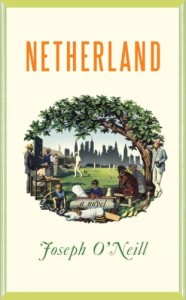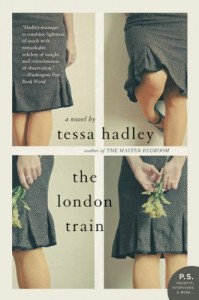 I read this weekend Joseph O’Neill’s Netherland, and came across a scene with a structure I’ve been noticing a lot lately. Or a kind of structural move I for whatever reason am these days more attuned to. It’s about 23 percent of the way through the novel (thanks, Kindle!). Hans is on a train up to Albany on business, and he opens the gift that Chuck sent him after their initial introduction. It’s a book of old Dutch children’s songs. One gets printed in full, in Dutch. Then this:
I read this weekend Joseph O’Neill’s Netherland, and came across a scene with a structure I’ve been noticing a lot lately. Or a kind of structural move I for whatever reason am these days more attuned to. It’s about 23 percent of the way through the novel (thanks, Kindle!). Hans is on a train up to Albany on business, and he opens the gift that Chuck sent him after their initial introduction. It’s a book of old Dutch children’s songs. One gets printed in full, in Dutch. Then this:
Adapting the melody of the St. Nicholas song that every Dutch child hungrily learns […] I hummed this nonsense about pigs and beans and cows and clover to my faraway son, tapping my knee against the underside of the lowered tray as I imagined his delighted weight on my thigh.
End of scene. Right? Hans has been living for a while now across the ocean from his wife and child, and this scene comes at the tail end of a summary of how that time has been spent. It hasn’t been easy, but nor has it been traumatic. Still, the image here, the imagined time spent with his son, is precisely the sort of thing we work toward in our scenes.
Except O’Neill doesn’t end the scene there. The scene shifts to flashback:
The week before, Jake and I had played in his grandparents’ garden. I raked leaves into piles and he helped me bag the leaves. The leaves were dry and marvelously light. I added armloads to the red and brown and gold crushed in the plastic sack; Jake picked up a single leaf and made a cautious, thrilled deposit. At one point he put on his superhero frown and charged a hillock of leaves. Wading into its harmless fire, he courageously sprawled. “‘Ook, ‘ook!” he screamed as he rolled in the leaves. I looked, and looked, and looked. Fronds of his yellow hair curled out from the hood’s fringe onto his cheeks. He wore his purple quilted jacket, and his thermal khakis with an inch of tartan turnup, and his blue ankle boots with the zip, and the blue sweater with the white boat, and—I knew this because I had dressed him—his train-infested underpants, and the red T-shirt he liked to imagine was a Spider-Man shirt, and Old Navy green socks with rubbery lettering on the soles. We gardened together. I demonstrated how to use a shovel. When I dug up the topsoil, I was taken aback: countless squirming creatures ate and moved and multiplied underfoot. The very ground we stood on was revealed as a kind of ocean, crowded and immeasurable and without light.
Blocks of color stormed my window for a full minute. By the time the freight train had passed, the sky over the Hudson Valley had brightened still further and the formerly brown and silver Hudson was a bluish white.
Unseen on this earth, I alighted at Albany-Rensselaer with tears in my eyes and went to my meeting.
 It reminded me of a passage in Tessa Hadley’s The London Train which I finished a couple weeks ago and had meant, while reading it, to blog about, but on looking back at the passage I couldn’t recall my original point or interest in it. Here’s the passage, a brief parkside chat between a woman and her sister-in-law. I’m gonna mark with asterisks the places where I, an amateur, would be keen to end the scene:
It reminded me of a passage in Tessa Hadley’s The London Train which I finished a couple weeks ago and had meant, while reading it, to blog about, but on looking back at the passage I couldn’t recall my original point or interest in it. Here’s the passage, a brief parkside chat between a woman and her sister-in-law. I’m gonna mark with asterisks the places where I, an amateur, would be keen to end the scene:
Cora wished she was alone; one of the girls in the choir had offered her a spare ticket for something at the theatre—it didn’t matter what. Yet the sunshine and the children’s noise and the playful scrap of breeze, riffling the pink candles in the horse chestnut, made out of the park an image of blissful leisure.
— Bobs thinks, Frankie said, drinking down fast, — that you can’t forgive him for the fire at the immigration removal place. But I said you couldn’t be that irrational. How could you think it was his fault? He has to take responsibility, in the chain of command, that’s how things work in government. But it’s not personal. It’s not morally his fault, in a way anyone could blame him for. You couldn’t think that.
— I thought you were the one going into the Church. Your idea of conscience seems pretty flexible.
— So you do blame him.
— Of course not, Cora said. — I know he’s an impeccably good man. Good in the way I’ll never be. But those centers are unspeakable, it’s a horror that they even exist. I can’t talk about it, it’s too awful.
— What do you mean, good in a way you’ll never be?
— Nothing. She added — I can’t imagine Robert saying that, about me blaming him for the fire. Whatever he thought, he wouldn’t actually say it.
— Perhaps not in so many words.
— You should make the words up, Frank. They’re important.*
— You’re right, I’m sorry.
— It’s OK.
— Only I did know what he was thinking. He is my big brother.
— You never could know, not for absolutely sure.*
They shifted positions on the blanket, each dissatisfied with the other,* Frankie unpacking hard-boiled eggs and yoghurts from a cool-bag, Cora stretching out on her back and pulling up the skirt of her dress in a semblance of sunbathing.* Lulu wandered out from the shrubbery to sit astride her, showing her an earthworm in a seaside bucket
— Look at my snake.*
— Don’t balance on your Auntie Cora.
— She’s not my auntie.***
— I don’t mind, Cora said. — She isn’t bouncing very hard.
But Frankie lifted Lulu by the armpits and swung her away, protesting, skinny legs bicycling wildly.* Only the memory of the contact with her heated little life remained across Cora’s pelvis and flat stomach for a few moments, vivid and distracting*** as when, the other week, Cora had had to pick up a starling that flew by mistake into the house and dazed itself, flashing around the ceilings and against the windows—its racing metabolism had seemed to leave its trace in her hands for hours afterwards.
So: I’m trying to figure out what’s attuning me to these scenes other than the weird unexpected presence of toddlers straddling adults. (Paging Dr. Freud….) Both end in flashback, but that’s not even the half of it. I think it’s in the authors’ pushing through scene and reflection to flashback that makes the scene’s moods or emotions land fully in our hearts-slash-minds.
Is that right? In the O’Neill, to end on the imagined bouncing son would get across to us readers That Hans Yearns. But What This Yearning Feels Like, or maybe even What Effects This Yearning Has On Him Each Day, we don’t get a sense of. In pushing us through the small narrative of gardening, the message of Hans’s Yearning is manifested. We don’t just know it, we feel it. Similarly, in the Hadley, the rapid switch from Lulu to impression of Lulu to trapped starling renders Cora’s ongoing curious mix of disorientation and solitude.
It’s clear that my poor choices of scene-ending above are the choices of a writer of short stories, or a writer of segmented essays. There, the long-form rhythms of the prose are so brief that they feel naturally orchestrated to these kind of syntactic sforzandos. These mini-surprises we reward the reader’s enjoyment of with echoic white space.
I think the point of all this is that in writing short stuff I’m always hyperconscious of the effect my prose is going to have on the reader at any given moment, and so I make structural or pacing choices based on those probable effects. Again, it’s orchestration of a kind. What I’m being more attuned to these days is an approach to scene that’s more concerned with the effects of the writing on the characters. It’s an approach that tends to what the character wants/needs to express in the moment, trusting that such tendance will give the reader what she wants/needs, too.